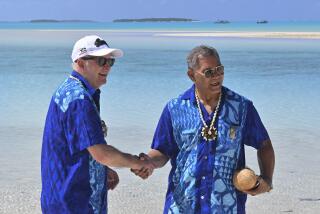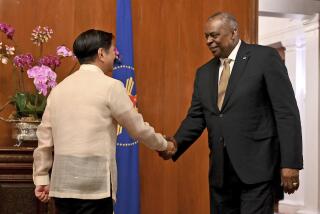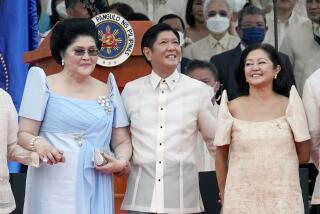Australia 1st to Boost Aid to Philippines
- Share via
MANILA — Australia on Monday became the first country to increase aid to the Philippines since the fall of President Ferdinand E. Marcos.
Australian Foreign Minister Bill Hayden, one of those who had been bitterly critical of the Marcos government in recent years, told the new president, Corazon Aquino, that his government will immediately increase its direct aid by 50%--to $18 million from $12 million. It will also revive a trade agreement and study the possibility of boosting military assistance, Hayden said.
The Australian pledge was the first in what is expected to be a series of greater commitments by donor countries in the post-Marcos period. Japan is considering reinstating two canceled trade pacts. A U.S. delegation, headed by M. Peter McPherson, administrator of the Agency for International Development, is scheduled to arrive here today.
“They will meet with Philippine government officials with a view of making recommendations to President Reagan regarding U.S. support of Philippine economic efforts,” U.S. Embassy spokesman Allan Croghan said.
U.S. Aid Request
While Marcos was still in power, the Reagan Administration sought $240 million in aid, including about $70 million in military assistance. And Reagan promised a significant increase if the Feb. 7 presidential elections were “credible.”
Those elections were marred by violence and fraud. A National Assembly dominated by Marcos supporters declared him the winner, but the president, who had ruled for 20 years, was subsequently driven from office in a popular uprising and military revolt.
There is bipartisan support for increasing U.S. aid to the Philippines. Rep. Stephen J. Solarz (D-N.Y.), chairman of a House subcommittee on Asian and Pacific affairs, recently urged “an immediate infusion of capital.”
“The United States should rapidly disperse the almost $200 million in various forms of economic aid we have already appropriated for the Philippines,” Solarz said. Additionally, “the United States and other nations in a position to help should commit themselves to a multiyear, multilateral foreign assistance program, providing for a significant increase in the level of their aid.”
However, U.S. diplomats here cautioned this week against any expectations of very large increases in aid. “Some people have talked about mini-Marshall plans for the Philippines,” one diplomat said. “I just don’t think that’s in the wind.”
As charges of corruption and human rights violations by the Marcos government increased, donor countries became increasingly reluctant to release money until some form of accountability could be established.
Personal Enrichment
“President Marcos, by fiat, could make decisions without any accountability,” Hayden remarked Monday.
The Aquino government is investigating allegations that much of the foreign aid was diverted by Marcos for his own enrichment and that of his cronies. Much of this wealth is believed to be overseas, including in the United States and Australia.
Hayden was the first official visitor received by President Aquino after she moved her office Monday into the guest house on the grounds of Malacanang Palace.
In keeping with a campaign pledge that she would not reside in the lavishly decorated presidential quarters in the palace compound, Aquino will continue to live in her modest residence in nearby Quezon City. The palace has already been used for public events.
Marcos’ quarters will be maintained as a museum to show his and his family’s excesses. Closets full of expensive clothing and perfume will be opened to the public beginning this week, a presidential spokesman, Ricardo Ramos, said.
Aquino’s first day in the palace office was marked by confusion and miscues. Few of the offices in the presidential office building had working telephones. The first press release from the new presidential press office, a statement that Australia had pledged to double its financial aid to the Philippines, was not true.
Meanwhile, the civil service staff employed by Marcos in the palace complex showed up for work, not quite sure of its function. Under Marcos, a staff of 55 civil servants was employed to file and index the president’s pronouncements and press clippings. They were all at their desks Monday morning.
More to Read
Sign up for Essential California
The most important California stories and recommendations in your inbox every morning.
You may occasionally receive promotional content from the Los Angeles Times.










